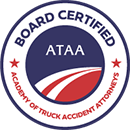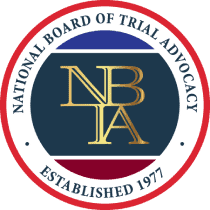Commercial Motor Vehicle Crashes Are Not Accidents
An accident is an event that occurs unexpectedly, unintentionally, and without any deliberate or apparent cause. Why, then, is this word so often used to describe collisions involving commercial motor vehicles (CMVs)? The true nature of these collisions is far removed from the definition of an accident, and yet the use of this language to describe truck crashes persists.
While there are many nuanced reasons behind our language choices, there is one undeniable and unsettling reason why we call these crashes “accidents”—trucking companies and their insurers want to cast doubt on causational factors.
Trucking Injury Law Group unequivocally believes that most commercial motor vehicle crashes are not accidents. Our years of experience representing truck crash victims have given us a unique and unparalleled insight into the most common causes of these collisions.
The Real Causes of Tractor-Trailer Crashes
While truck collisions can be particularly complex with multiple other at-fault parties, the majority of tractor-trailer crashes can be traced back to at least one of two causes: truck driver error or trucking company negligence.
So, what exactly does this mean? If there is a known cause, whether deliberate or not, then we cannot fully describe a collision between a commercial motor vehicle and a passenger vehicle as an “accident.” With that in mind, let’s take a closer look at the top causes of CMV crashes:
Truck Driver Error
In order to drive a semi-truck or other CMV, an individual must be at least 18 years of age (21 to drive interstate), pass a drug test, complete required medical examinations, complete a background check, obtain a commercial driver’s license (CDL), and undergo training.
Truck drivers are professional drivers who have made a career out of driving CMVs. Just like we entrust other professionals to act in a manner that respects the safety and well-being of those they interact with, we should be able to share the road with truckers without fear of being involved in a crash. Unfortunately, we know that the opposite is often true.
Despite the rigorous requirements to become a truck driver and regulations set forth by the Federal Motor Carrier Safety Administration (FMCSA) and state agencies, we have seen again and again how truckers act carelessly while behind the wheel.
Examples of truck driver errors that can cause a crash include:
- Speeding
- Driving too fast for visibility, road, or weather conditions
- Following too closely (tailgating)
- Changing lanes or passing without looking
- Aggressive and reckless driving
- Driving while texting, talking on, or otherwise using a phone
- Taking videos or pictures behind the wheel
- Driving while tired or exceeding federal hours-of-service (HOS) regulations
- Driving after drinking or ingesting illicit substances
If a trucker fails to perform pre- or post-trip inspections, does not report mechanical problems to their employer, or ignores obvious signs of wear and tear on their truck, they are committing critical errors that may ultimately cause what should have been a preventable crash to occur.
Trucking Company Negligence
We rely on commercial motor carriers to organize and orchestrate the daily movement of 55.2 million tons of freight. Our access to everything from groceries and medications to clothing and home goods is reliant upon the trucking industry. However, that is no excuse for truck companies to act in a way that is negligent to the safety of motorists and their passengers.
And yet we routinely see big truck companies value profit over safety, prioritizing their own bottom lines over the lives of their employees and those who travel by passenger vehicle, bus, bicycle, or foot, or who use our roads in any capacity.
A crash involving a CMV cannot be considered an “accident” if any of the following were at play:
- The creation and enforcement of unreasonable delivery schedules
- Inadequate maintenance
- Inadequate new-driver training
- Insufficient screenings for new drivers
- Failure to perform drug and alcohol tests as required by law
Why Do We Use the Word “Accident”?
If we don’t believe that a collision between a CMV and a passenger vehicle can ever truly be called an “accident,” then why do we continue to use that word? As attorneys who have dedicated our professional careers to advocating for injury victims, we know that we can’t do that unless we reach the people who need us.
The reality is that most people use terms like “truck accident” when searching for someone who can help them make sense of what happened. By using the language of those who have been injured, we know that we can ensure we’re in the right place at the right time. We’re not here to pick a fight over the terms people feel most comfortable using—we’re simply here to help.
If you’re ready to talk about what happened to you, we’re here to listen. Trucking Injury Law Group is proud to provide free consultations to those who have been injured by truck driver error or trucking industry negligence.






